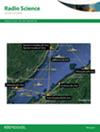Analysis of two selected solar events in 2011 and 2015 with Mars express radio occultation data
IF 1.6
4区 地球科学
Q3 ASTRONOMY & ASTROPHYSICS
引用次数: 0
Abstract
The temporal behavior of the Martian ionosphere is highly variable due to various dynamic processes including space weather events. Here, we study the effect of solar flares and coronal mass ejections (CMEs) on the Martian ionosphere for two selected solar events in 2011 and 2015, using the publicly available Mars EXpress (MEX) radio occultation (RO) data (MaRS). We developed a data processing software that converts the calibrated Radio Occultation (RO) Doppler data to scientifically valuable atmospheric profiles. Using this software and previously unexplored MaRS observations, the variations in ionospheric parameters (electron density profiles and total electron content (TEC)) are calculated in order to evaluate the ionospheric changes due to solar flares and CMEs. The RO measurements mostly available 1-4 days apart from the peak events, showed no evident change in the TEC nor in the shape of electron density profiles except for a possible gradual decrease in altitude of M2 (main layer) peak density following the arrival of CMEs. To better quantify the effect of solar events on electron density profiles, RO observations near the time of arrival of solar flares and CMEs are crucial. This can be achieved by frequent RO measurements by various Mars orbiters including spacecraft-to-spacecraft measurements assisted by multi-instrument monitoring of the ionosphere.利用火星快车射电掩星数据分析 2011 年和 2015 年两次选定的太阳事件
由于包括空间天气事件在内的各种动态过程,火星电离层的时间行为变化很大。在此,我们利用公开可用的火星EXpress(MEX)无线电掩星(RO)数据(MaRS),研究了2011年和2015年两次太阳耀斑和日冕物质抛射(CME)对火星电离层的影响。我们开发了一款数据处理软件,可将校准过的无线电掩星多普勒数据转换成具有科学价值的大气剖面图。利用该软件和以前未探索过的 MaRS 观测数据,可以计算出电离层参数(电子密度剖面和电子总含量(TEC))的变化,从而评估太阳耀斑和 CME 引起的电离层变化。RO 测量大多是在峰值事件发生后 1-4 天进行的,结果表明,除了 M2(主层)峰值密度的高度在 CME 到达后可能逐渐降低外,TEC 和电子密度剖面的形状没有明显变化。为了更好地量化太阳活动对电子密度剖面的影响,在太阳耀斑和CME到达时间附近进行RO观测至关重要。这可以通过各种火星轨道器的频繁 RO 测量来实现,包括航天器对航天器的测量,以及电离层的多仪器监测。
本文章由计算机程序翻译,如有差异,请以英文原文为准。
求助全文
约1分钟内获得全文
求助全文
来源期刊

Radio Science
工程技术-地球化学与地球物理
CiteScore
3.30
自引率
12.50%
发文量
112
审稿时长
1 months
期刊介绍:
Radio Science (RDS) publishes original scientific contributions on radio-frequency electromagnetic-propagation and its applications. Contributions covering measurement, modelling, prediction and forecasting techniques pertinent to fields and waves - including antennas, signals and systems, the terrestrial and space environment and radio propagation problems in radio astronomy - are welcome. Contributions may address propagation through, interaction with, and remote sensing of structures, geophysical media, plasmas, and materials, as well as the application of radio frequency electromagnetic techniques to remote sensing of the Earth and other bodies in the solar system.
 求助内容:
求助内容: 应助结果提醒方式:
应助结果提醒方式:


